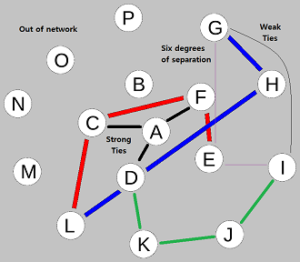
The strength of weak ties
The theory of networks, not in the focus of social media, but of the ties between actors has some curious properties and two are very special: the six degrees of separation and the strength of weak ties (Weak ties) that seem strange to those who are unaware the theory.
social media, but of the ties between actors has some curious properties and two are very special: the six degrees of separation and the strength of weak ties (Weak ties) that seem strange to those who are unaware the theory.
The six degrees of separation indicate that seen as networks, the relationships between social actors are, in reality, more connected than one imagines, and this is not just in the world of social media (which is incorrectly put equivalent with social networks).
A classic experiment, called the Milgram experiment due to the work of psychologist Stanley Milgram, who sent letters to certain distant people, and identified ties of personal knowledge existing between any two people, and discovered an average distance of 5.5 people to letters reach their destination.
The experiment had flaws, such as letters that were not sent forward and ended up in an intermediary and the lack of knowledge of the objective of certain people in the experiment, for example, not understanding that the letter should go as close to the final destination.
The weak ties experiment carried out by Mark Granovetter (1973) takes into account the weakest and most distant contacts in social networks, and can, in certain contexts, mean that the ties between two people who have similar interests are strong, even if they pass by some intermediary C, and this makes C also part of the strong loop.
So the weak tie will be just the opposite, A and B have distant interests and connection routes, which can mean different or just distant interests, however in network theory these ties are important for the functioning of the network and its dynamization, unlike the what common sense says.
What Granovetter researched is that the greater the strength of the bond between two people, the greater the chance that the circle of friends and ties will be common and that the message will only stay in that circle, not reaching other circles of relationships and expanding the network.
In this sense, limiting or banning social networks means reducing and making the social network (which is not necessarily done via the media) limited, however, there are networks that commit certain crimes and should not be legitimized and, when possible, banned.
This is discussed within the issue of power, because the theory of networks contradicts the idea of an increasingly stronger and centralized power as a solution to social problems, because even if prohibited, social networks continue to function as established by the theory of the six degrees of power. Separation and distance between actors is smaller than centralized power assumes, as it is often isolated in its social or ideological “bubble”.
Social networks dynamize the structures of social ties and ignoring them can be a source of empowerment for different social groups and helps to grow true popular will.
GRANOVETTER, Mark S. The Strenght of Weak Ties. The American Journal of Sociology, vol. 78, n. 6, p. 1360-1380, may 1973.









